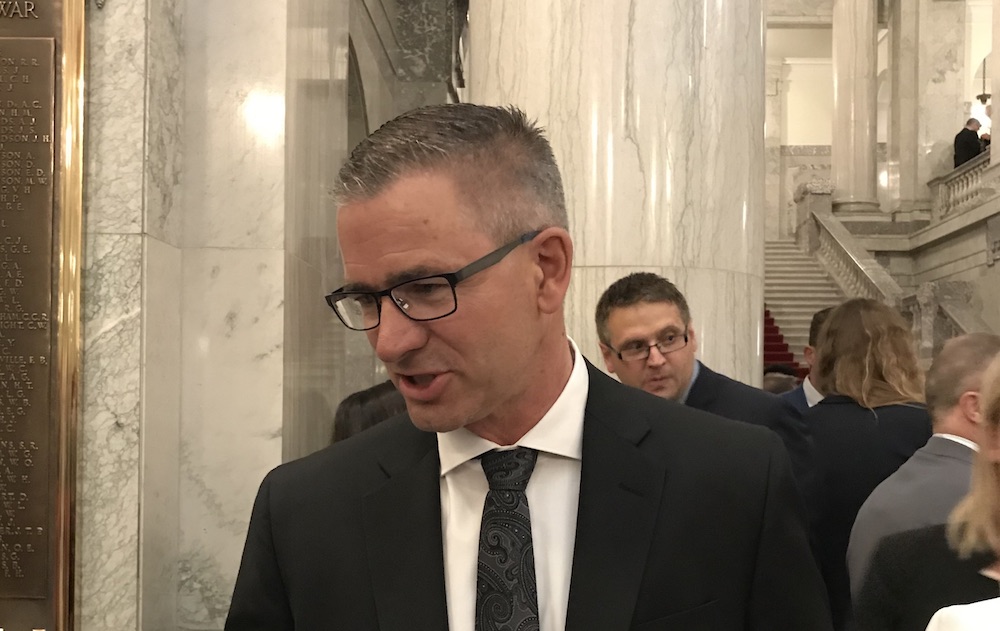Alberta Premier Jason Kenney and his government moved yesterday to impose big changes on public-sector bargaining in Alberta, not to mention a host of other areas. They’re sure to unleash a flood of litigation.
There’s enough stuff embedded in the Harper-government-style omnibus budget legislation introduced to the Alberta legislature yesterday by Finance Minister Travis Toews to make it pretty hard to keep track of — which, presumably, was half the point.
The other half, of course, would have been to avoid having to debate a host of additional bills, which under parliamentary government is really how legislation ought to be introduced.
So in addition to picking a fight with the doctors and trying to tilt the playing field in bargaining with public-sector unions heavily in the government’s favour, there are provisions that would allow higher interest on student loans, let inflation eat into assured income for the severely disabled, impose crippling budget cuts on post-secondary institutions, and maybe even let the province grab cash from municipal speeding fines!
On the labour relations front, something called the Public Sector Employers Act would let the government give secret mandatory orders to employers during negotiations related to any term of the collective agreement.
This possibly unconstitutional provision is buried in Bill 21, the Ensuring Fiscal Sustainability Act, 2019, introduced with its companion law, Bill 20, the Fiscal Measures and Taxation Act, 2019.
I’m not making this up. Consider: “A directive issued by the Minister under this Act is confidential and may not be disclosed by the employer to any third party without prior consent of the Minister.” Presumably that means including the people the employer is negotiating with — which, needless to say, is not a formula for encouraging good-faith negotiations.
Naturally, it’s certain that someone — perhaps several people, all of them lawyers working for public-sector unions — will argue just that. They may have a reasonable chance of success.
The government would also have the right to impose the time frame of agreements — very long ones, presumably, with no pay increases. Readers will get the picture.
Of course, Section 33, the Canadian Charter of Rights and Freedoms’ notwithstanding clause, awaits in the event the courts are unimpressed with the Alberta government’s legal reasoning, as seems quite likely. How ready the UCP will be to use that tool, though, will presumably depend on whether or not Kenney has given up his prime ministerial dreams.
Bill 21 also includes provisions to lift the previous NDP government’s ban on the use of replacement workers during strikes (to which the Supreme Court has ruled workers have a right to resort) where an essential services agreement is in place.
In other words, the government wants to have it both ways — essential services rules, plus the ability to hire scabs.
Interestingly, as noted, the government also seems prepared to take on physicians — always a risky strategy. Bill 21 will give it the power to unilaterally end the doctors’ current agreement, signed by the government and the Alberta Medical Association last year.
The UCP’s thinking here seems to be that since that deal was negotiated by the NDP, it has no validity anyway. This may not sound to you, dear readers, like the way representative democracy works, but all the evidence suggests it’s nevertheless the way Alberta’s Conservatives think.
Perhaps the UCP reckons it can placate members of the medical profession for tearing up their agreement by offering rich opportunities to make a killing, metaphorically speaking, through privatization.
Bill 21 also includes provisions that would force new physicians to go where the government wants them to — not where they choose. You want to go to Calgary, you say, not Manyberries? No billing number for you, then!
Needless to say, this is likely to be found unconstitutional by any court worthy of the name under the mobility rights section of the charter, which is not subject to the notwithstanding clause. But what the hey, the government must be thinking, nothing ventured nothing gained!
Thwarted by the courts, Kenney could always unilaterally declare independence — a thought that nowadays doesn’t seem as remote to his ilk as it once might have, because Trudeau, and all that. (Something to think about: Pierre Trudeau had the right idea about how to deal with that kind of thing; it may still linger somewhere in the Liberal Party’s lizard brain.)
This is not a government much enamoured of due process or the rule of law, of course, unless there’s something in it for them. So expect a protracted legal fight, enriching lawyers, not necessarily of them all Conservatives. Stand by for updates.
David Climenhaga, author of the Alberta Diary blog, is a journalist, author, journalism teacher, poet and trade union communicator who has worked in senior writing and editing positions with The Globe and Mail and the Calgary Herald. This post also appears on David Climenhaga’s blog, AlbertaPolitics.ca.
Image: David J. Climenhaga



